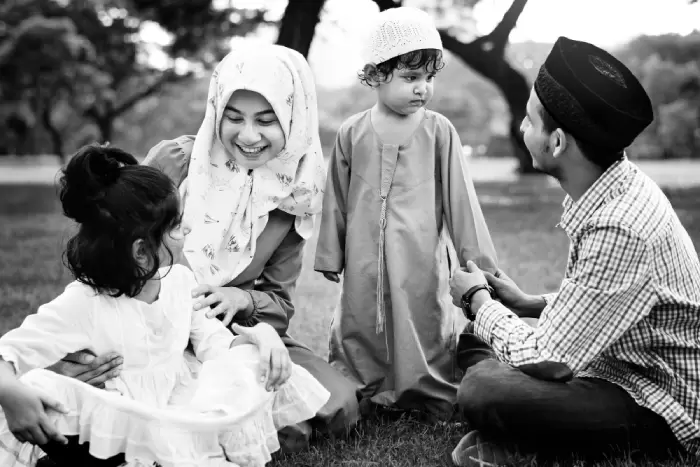
INTRODUCTON:
Islam feeds and educates the child in a distinctive systematic way that other modern methods cannot give him; it stems from the values of the True Religion and its principles, and is characterized by having an integrated approach that cares about the individual's mental, psychological and moral components in order to achieve among all these components a balance that reaches the correct behavior of a Muslim.
DEFINITION:
Islamic education is our means of preserving the Islamic heritage and building the basis of faith in the child. The blessing of being born a Muslim is the greatest blessing. Here, what we are trying to do is to feed the student with the basics of religion in a way that suits his age stage with various supplies of reform and correction in an Islamic framework.
BRANCHES:
For example, if a student starts studying Fiqh, he must, at first, know about purity; its provisions and conditions, then Wudu, prayer, fasting, performing Hajj and Umrah, how to pay zakat, and others. But if he takes the path of Aqida, the first thing that should take root in his mind is Tawheed and Shahadah, then he will begin to differentiate between the two types of Tawheed, then the types of Shirk and then to something more advanced. Also, the branch of Sirah; to know of the Prophet (peace and blessings of Allaah be upon him) and his companions, and finally, the branch of Islamic etiquette, what a Muslim should say and do.
WAYS OF STUDIES:
The curriculum of Islamic Studies takes several ways; the first of which is: faith education, which is teaching the child what Islam is and the principles of faith, Aqida, Hadith and others. Then there is moral education, which is the emotional aspect, which means the behavioral and moral axis, such as honesty, charity, kind words and the etiquette of Islam. The third point is mental education, through which the student's skills and mental inclinations can be directed towards the appropriate studies to subject the mind to the commands of the True Religion. All these stages are carried out through the last stage, which is psychological education, which is based on the gradual delivery of information by urging to take the messenger as a role model and enhance the child's sense of love and security, and addressing his mind and emotion about the importance of this aspect of study.
BOOKS AND METHODS:
So, what ways and Means can be used to provide this environment of faith?
First, and above all, provide the necessary books such as “Jannat AL-quran” and the “I love Islam” series if the student is a beginner, then the first three stages of “Islamic studies” books if the student is an intermediate level, up the remaining five stages if he is an advanced level.
Secondly, the narrative “Sirah”, mainly the biography of the prophet and the stories of the prophets and companions. After that, to provide modern methods, data and links necessary to get all aspects of the topic during the explanation. Then, using thinking skill during content teaching for the student, to learn the subordination of the mind to the principles of religion. Fourth and finally, cooperative education, such as intelligent discussion, evoking life situations, then projecting them on the subject, and making the student aware of the history of his religion.
TARGET AND FINAL RESULTS:
After all this explanation, you may be wondering, what is the purpose of the Islamic Studies Program?
Promote the ethics and ethics of Islam by applying them in practice between the teacher and the student before the end of the lesson.
Increase awareness of the history of Islam through the lessons of biography and Quranic stories,
Draw the optimal picture of religion in the student's mind, and if the surrounding environment is non-Islamic, then learning Islamic Studies is the only way for him to walk among them and his heart is reassured by faith.





